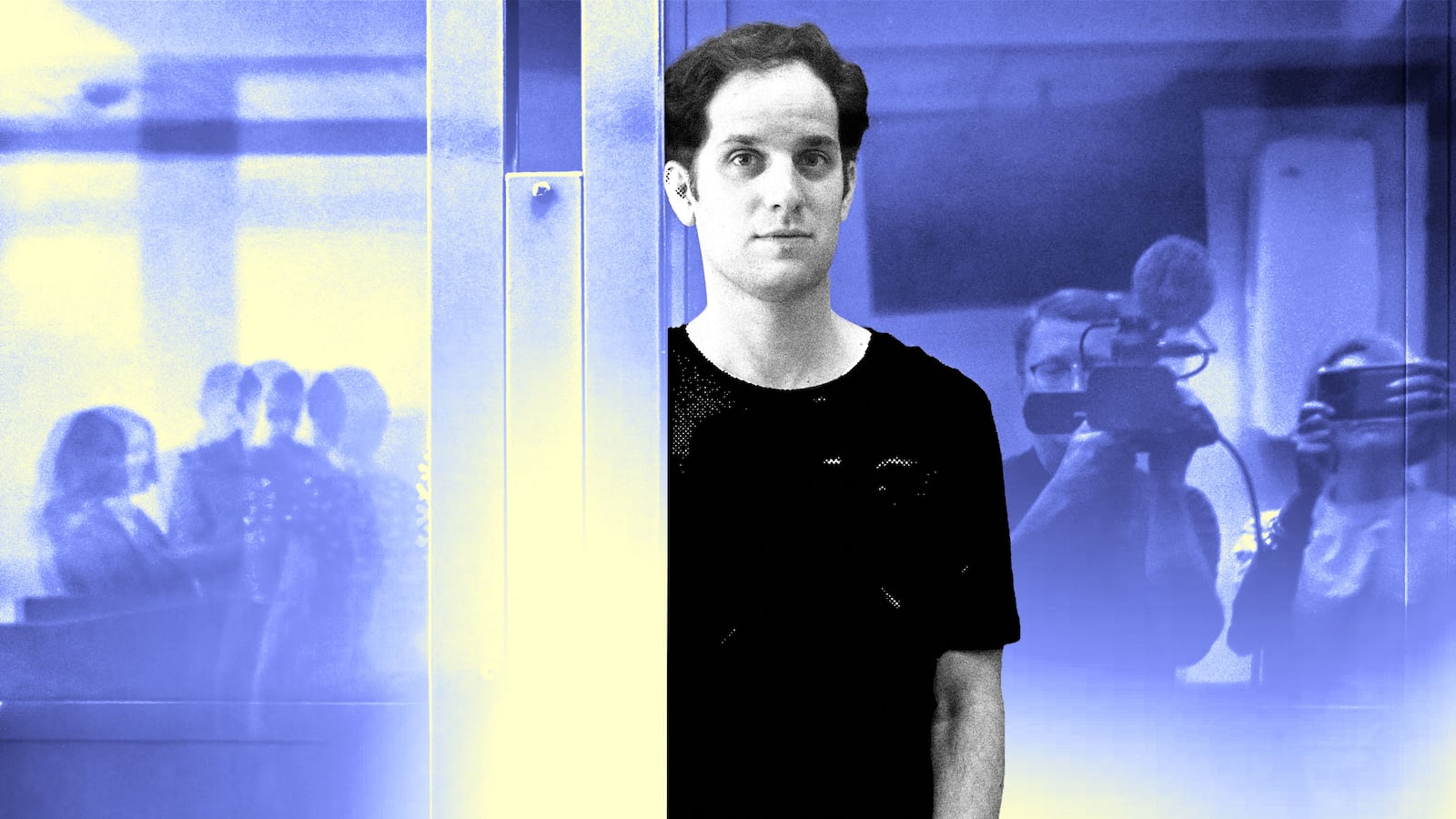The U.S. ambassador to Russia, Lynne Tracy, recently visited our colleague, Wall Street Journal correspondent Evan Gershkovich, at the Federal Security Service’s toughest prison in Moscow.
Gershkovich was in “good health and remains in good spirits,” the ambassador said, which was the best news from inside the “political prison,” as Russians call the FSB’s investigative pre-trial detention site, Lefortovo.
Friday March 29 marks one whole year that the 32-year-old American reporter has spent behind bars awaiting his trial. On Tuesday, a Russian court extended his detention—for a fifth time—by another three months.
Since the time of Josef Stalin’s mass repressions, Russia’s secret police have broken the spirits of dissidents and foreign spies alike in Lefortovo.
Gershkovich is neither. He is a devoted and hardworking journalist. Even after hundreds of journalists had escaped Russia in the early days of Russia’s full-scale war in Ukraine, Gershkovich continued to report stories on the ground about the true situation with Russia’s economy, the Kremlin’s tensions with the United States, and Russia’s attacks on Ukraine.
All these topics took a lot of courage to report. As a professional journalist, he provided the readers with the usual watchdog service; he listened attentively to what authorities said, then went and checked. Collecting information and fact-checking is what journalists do.
Gershkovich is in Lefortovo for his journalistic work. That is a place where courage is really needed.

Wall Street Journal reporter Evan Gershkovich appears in a court in Moscow court to appeal against the decision to keep him in a former KGB prison.
Sefa Karacan/Getty ImagesA defense lawyer for Paul Whelan, another American prisoner who spent his pre-trial detention at Lefortovo, once told me that every time he visited the prison, he felt physically sick and wanted to crawl in bed and stay under blankets: “Its walls seem to scream of human pain,” the lawyer said.
Personally, I have been feeling increasingly worried about Gershkovich’s future, especially after Putin spoke with Tucker Carlson, who asked Putin to release the American as “a sign of decency.” Carlson indicated how important Gershkovich is to the U.S., that his arrest was huge news back home, where millions of people want him released immediately. Putin replied that he had already shown so many “gestures of good will out of decency that I think we have run out of them.”
This is wartime, when hundreds of thousands are dying. Decency is not being discussed. But even on the worst days of battle between Russia and Ukraine, prisoner exchanges have taken place and hundreds of prisoners were able to return home.
In the same interview with Carlson, Putin also said that an “agreement could be reached,” hinting that Gershkovich could be swapped for a Russian being held in a “U.S.-allied country,” as a result of “liquidating a bandit.”
Putin’s hints were clear enough. He was almost certainly referring to Vadim Krasikov, an FSB assassin important to Putin, who is serving a life sentence in Germany for killing a Chechen guerilla commander in Berlin in 2019.

US ambassador to Russia Lynne Tracy leaves the grounds of the Moscow City Court after a hearing to consider an appeal of US journalist Evan Gershkovich.
Natalia Kolesnikova/Getty ImagesJournalism is not a crime, of course, but Russia’s reality is different.
According to a report by the Committee to Protect Journalists, “Twelve of the census’ global total of 17 non-local imprisoned journalists are held by Russia.” The numbers are growing fast. Ukraine reported 25 of its reporters are held in Russian jails.
“The Kremlin is building up a swapping fund: after Gershkovich, they arrested a U.S.-Russian citizen, Radio Liberty reporter Alsu Kurmasheva, and other people to swap for Russia’s own prisoners around the world such as Krasikov but also those convicted of cyber crimes,” a long-time Kremlin observer, Olga Bychkova, told me.
And recent news out of Russia has been horrific. Aleksey Navalny died from “sudden death syndrome” in another notorious Russian jail; a Russian pilot, Maksim Kuzminov, who had defected to Ukraine, was killed near Alicante in Spain. Russia arrested another U.S. citizen, 33-year-old Ksenia Karelina, for donating $51 to a Ukrainian charity.
A year ago, I asked the deputy head of the opposition Yabloko Party, Lev Shlosberg, if we should be worried. “You should be—there are no options for swapping him yet,” he said. “Evan will remain in jail for as long as Putin wants; he will let him go when he wants, if he wants it.”
This week, I called Evan’s closest friends in Berlin, where Evan was visiting shortly before his arrest last year. The stories I heard filled me with optimism, unexpectedly.
Evan’s friends reminded me of the healthy spirit of journalistic solidarity, of pure friends’ love, and bottomless optimism—all the best qualities of Gershkovich’s character.
Despite terrifying espionage-related charges, Evan shines smiles to us through the glass of his box in courtrooms. No words are needed.
Evan’s close friends were preparing to gather on Friday on the one-year anniversary of his time behind bars. And while the date is grim and solemn, they want to make it a celebration, as well. The hope is to bring some joy to their imprisoned friend—they’re each going to write a personal account about the party, so Evan could read and see the gathering from different angles.
“We have grown much closer during this year corresponding with Evan—we try to support him but actually, he has been supporting us a great deal,” Maria Borzunova, a 29-year-old Russian journalist exiled in Berlin told me. “He thinks of each one of us, he sends us greetings with our birthdays and even organizes presents.”
Something beautiful has bonded Gershkovich with journalists around the world—from warm Australia to windy Brighton beaches. “I wrote letters to him and he answered, his notes were warm and fun; I try not to think of anything dark, when I think of Evan,” Brighton-based reporter Victoria Silchenko shared with me.

Journalists and members of the Independent Association of Publishers' Employees a rally to call for release of Wall Street Journal reporter Evan Gershkovich.
Chip Somodevilla/Getty Images/Chip Somodevilla/Getty ImagesOf course there is also bitterness, and there is pain.
“Yes, there are plenty of reasons to be worried, but we are all trying to do our best to tell the truth about Evan: he is a journalist, he did his job,” Borzunova, who writes letters to Gershkovich every week, told me. “A year has passed by, and we still do not understand why he is in prison and not with us in Berlin right now. Why did this whole year fall out of his life?”
Polina Ivanova, one of Evan’s closest friends, has been campaigning for Evan’s freedom and supporting his family. She refuses to feel down.
“We all have so many reasons to feel worried,” she says. “It’s true, many of us feel utterly exhausted from the horrific and often hopeless stories we report.” Ivanova cautions that Gershkovich’s detention can’t be directly compared to those of other prisoners in Russia.
“Evan is our friend who we love very much… we cannot see [him] in person right now, this is very hard,” Ivanova told me on Tuesday. “Evan’s real story and the conditions he is in are different from other cases: I know, I can see from the photographs, from the letters I receive, that Evan is strong and healthy, despite the isolation. I know how strong he is, but of course the longer this goes on, the longer he is far from his family and work, the harder it is to survive this. So we should keep writing stories about Evan.”
Unlike many heartbreaking stories we report, this one is actually hopeful—it is about decency, friendship, solidarity, love.
No matter how worried we are, we should not allow Evan’s story to turn into a routine one, we should keep our spirits up, believe that the work that is being done at the highest levels by the Wall Street Journal’s lawyers, by President Joe Biden’s administration, by diplomats, and by our vast and well-organized journalistic community will eventually succeed—and Evan will return home to his loved ones.









